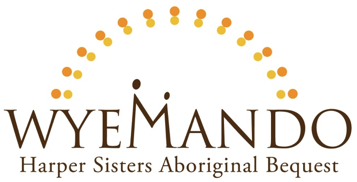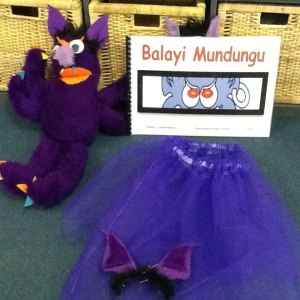Wajarri Language Hub Pilot Stage 2
Bundiyarra – Irra Wangga Language Program, Geraldton
September to December 2013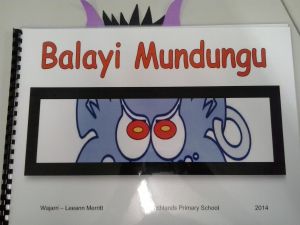
The second stage of the Wajarri Language Hub built on the success of Stage 1. As in the first pilot stage, this stage consisted of twice weekly, one hour long language sessions over six weeks, to a target audience of approximately 24 four- and five-year olds at Meekawaya Aboriginal Pre-School in Geraldton.
Two partial Wajarri speakers, who had been mentored by a senior language worker from Bundiyarra – Irra Wangga (BIW) in Stage 1, were again employed to help facilitate a weekly two hour activity session. Utilising the theme of body parts, these incorporated storytelling, singing, flashcard activities, sentence pattern activities (used to help students to learn sentence structure), dancing and games with instruction in language and some directed language teaching. The focus was on further exposure to language rather than structured language teaching.
“We feel so proud to be doing this and have learnt so much” Wajarri speaking facilitators
“Parents are really happy about the lessons and learning a few words from their children” Classroom teacher
Outcomes
- Opportunity for children to experience language being taught by Aboriginal people
- Positive cultural role modelling to young Aboriginal children, including early awareness of language
- Parental and wider community pride in seeing their children talking and singing in their local language
- Increased parental (and even grandparental) interest in visiting the classroom and in learning Wajarri
- Local press coverage of BIW and the program
- Increased community engagement with BIW language centre. For example, at Meekawaya Kindergarten’s information and registration day, BIW’s booth was the most visited of all the community groups and services present.
- Continued support among the school staff and principal for Wajarri
- Consolidation of the two Wajarri speakers’ capacity who, after observing the BIW senior language worker in Stage 1, were able to deliver language sessions themselves
- Establishment of ‘Master-Apprentice’ relationships with local elders by the two (partial) Wajarri speaking facilitators, to improve their mastery of the language and ensure that knowledge is being handed down to younger speakers
- Enrollment of three project personnel in the WA Education Department’s Aboriginal Languages Teacher Training Course (including Meekawaya’s Aboriginal and Islander Education Officer). Their graduation in September 2015 will increase the number of qualified Wajarri language teachers in Geraldton from one to four. This is a significant boost for a region which previously had few Aboriginal people skilled in the delivery of school and community language classes.
- Uptake of Wajarri as a LOTE subject across K-7 at Beachlands Primary School (of which Meekawaya is part), as a result of “seeing the teaching in action.” Replacing Indonesian, Wajarri offers both Aboriginal and non-Aboriginal children the chance to learn a local language which is relevant to their location and lives. The new trainee language teachers are involved in the program delivery.
- Delivery of language lessons at a further two Geraldton primary schools (Waggrakine PS and Rangeway PS) by the new trainees
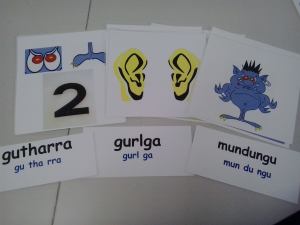 |
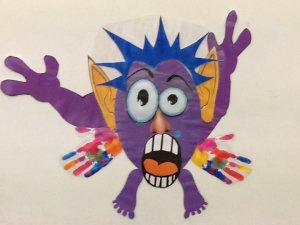 |
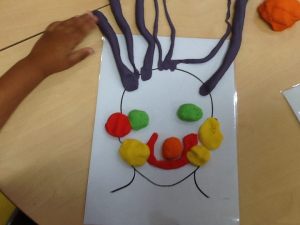 |
Further Observations by BIW
“These Wajarri language pilot projects will go some way to overcome two major barriers to language transmission work in the region: it has generated intense interest amongst the Aboriginal community and at the same time developing young speakers to take on the role of language teachers.
“The pilots have increased the status and visibility of the Wajarri language and interest in it, within both the Indigenous and broader community. The project has culminated in a successful model which will be used for future programs aimed at integrating language into schools and community.
“[The] principal of Meekawaya…attended every meeting and observed a number of language sessions. [She] was highly supportive of this project and has been approached by other schools who are interested in implementing this model.
“At the completion of this pilot it will be imperative that the instruction, curriculum, methodology and resources are developed as a teaching resource and shared with other schools who are interested in implementing this within their own school curriculum. … The resources developed throughout this project will be made available to schools who elect to teach Wajarri as their LOTE language. A Wajarri App has been developed for schools to contribute to these Wajarri resources for schools.”
![]()
